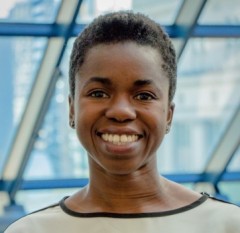by Eden Suh, CFICE Volunteer
Abigail Moriah has been a member of CFICE’s Steering Committee since 2015 and was appointed as the committee’s Community Co-chair at the end of 2016.
 Moriah was introduced to CFICE while attending a forum in Brazil where she connected with fellow CFICE members. The forum aligned with Moriah’s interests in teaching academic institutions how to support the work of community building and non-profit organizations: “Personally, I value the engagement between academic institutions and the research of a collaborative community. It exposes me to the ways that post-secondary institutions implement policy and improve practice with non-profit organizations and the community.”
Moriah was introduced to CFICE while attending a forum in Brazil where she connected with fellow CFICE members. The forum aligned with Moriah’s interests in teaching academic institutions how to support the work of community building and non-profit organizations: “Personally, I value the engagement between academic institutions and the research of a collaborative community. It exposes me to the ways that post-secondary institutions implement policy and improve practice with non-profit organizations and the community.”
Moriah has actively volunteered throughout her life in the public, non-profit, and community-based sectors. Her expertise in urban and community planning has enabled her to better put research into practice for CFICE.
Her role on the CFICE Steering Committee has been to help oversee the project and provide strategies and guidance for the overall operation. She believes that research plays a critical role in improving practice, regardless of the sector. As a practitioner herself, Moriah sees CFICE as a venue where she can ask her burning questions about community-campus engagement work, like, “Why can’t it be shaped differently?” “Are there ways to have different priorities?” “Do we dedicate more resources or broaden the scope?” The answers to these questions have ultimately helped her understand the implications of community-based research. “It highlights both the benefits and the challenges of institutions and their ability to shape the scope of projects.”
Recently, Moriah and the Academic Co-Chair of the Steering Committee, Karen Schwartz, created and administered a survey for the Steering Committee to better understand and engage members with the project. “I am hoping that this recent development will strengthen the steering committee’s engagement with its role and ensure success for the project.”
 Moriah’s visions for CFICE’s future include the opportunity to shape the conversation around community-campus partnerships and how they benefit the community. She states that CFICE is, “Well positioned to provide evidence and practical guidance to how this work is done in Canada.” Moriah acknowledges the gaps in society and wishes to create and develop an inclusive community. She essentially sees the potential in projects like CFICE and collaborations between academic institutions and the community to address and resolve such societal gaps through theory and practice.
Moriah’s visions for CFICE’s future include the opportunity to shape the conversation around community-campus partnerships and how they benefit the community. She states that CFICE is, “Well positioned to provide evidence and practical guidance to how this work is done in Canada.” Moriah acknowledges the gaps in society and wishes to create and develop an inclusive community. She essentially sees the potential in projects like CFICE and collaborations between academic institutions and the community to address and resolve such societal gaps through theory and practice.
“I hope to be able to contribute better to practices that strengthen the involvement of the minorities and racialized communities in community planning. There is still lots of room for improvement in terms of urban planning and community planning to include and involve populations that are traditionally not involved in conversations that shape cities and communities.”